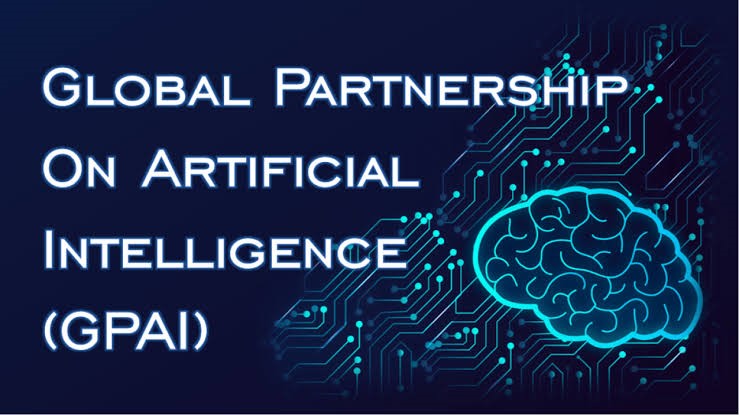
Global Partnership on Artificial Intelligence

09.12.2023
Global Partnership on Artificial Intelligence , Daily Current Affairs , Best IAs Coaching in Lucknow
|
For Prelims: About the Global Partnership on Artificial Intelligence,Theme,Structure,What is AI?,Reports and Indices by OECD For mains paper:How does this initiative work?,How does this help Bharat ?,Recent Initiatives by Bharat in the Field of AI,Key facts about Organisation for Economic Co-operation and Development (OECD),Objectives |
Why in the news?
India is hosting the Annual Global Partnership on Artificial Intelligence (GPAI) Summit from December 12 – 14, 2023.
Key Points
Theme: Advancing Responsible AI in Public-Sector Applications
About the Global Partnership on Artificial Intelligence:
- It is a multi-stakeholder initiative which aims to bridge the gap between theory and practice on AI by supporting cutting-edge research and applied activities on AI-related priorities.
- It was launched in June 2020.
- Membership in GPAI is open to all countries, including emerging and developing countries.
- Member countries: At present it has 28 member countries including the European Union.
- India is one of the founding members of GPAI.
- Secretariat: Its secretariat is hosted at the Organisation for Economic Co-operation and Development (OECD), Paris.
Structure
- It has a Council and a Steering Committee.
- It has two Centres of Expertise: One in Montreal and another in Paris.
- These Centres of Expertise will facilitate GPAI’s four working groups and their research and practical projects, across various sectors and disciplines.
- The working groups will initially focus on four themes:
○Responsible AI
○Data Governance
○the Future of Work
○Innovation and Commercialization
How does this initiative work?
- It will bridge the gap between theory and practice on AI by supporting cutting-edge research and applied activities on AI-related priorities.
- In collaboration with partners and international organizations, GPAI will bring together leading experts from industry, civil society, governments, and academia to collaborate to promote responsible evolution of AI.
- It will also evolve methodologies to show how AI can be leveraged to better respond to the present global crisis around COVID-19.
How does this help Bharat ?
By joining GPAI as a founding member, India will actively participate in the global development of Artificial Intelligence, leveraging upon its experience around use of digital technologies for inclusive growth.
What is AI?
Artificial intelligence is the branch of computer science concerned with making computers behave like humans.
AI refers to the ability of machines to perform cognitive tasks like thinking, perceiving, learning, problem solving and decision making.
Recent Initiatives by Bharat in the Field of AI
- Bharat has recently launched National AI Strategy and National AI Portal and have also started leveraging AI across various sectors such as education, agriculture, healthcare, e-commerce, finance, telecommunications, etc.
- The National AI strategy was released in 2018 by NITI Aayog. It is termed ‘AIForAll’ as it is focused on leveraging AI for inclusive growth in line with the Government policy of Sabka Saath Sabka Vikas.
- National AI Portal: It has been developed jointly by the National e-Governance Division of the Ministry of Electronics and Information Technology (MeitY) and the National Association of Software and Service Companies (Nasscom). The portal is meant to work as a “one stop digital platform" for all AI related developments in India.
- Responsible AI for Youth Programme: It is aimed at imparting education and skills in AI to students in government schools.
Key facts about Organisation for Economic Co-operation and Development (OECD):
- It is an international organisation of 38 countries committed to democracy and the market economy.
- OECD members are typically democratic countries that support free-market economies.
- The OECD was established on Dec. 14, 1960, by 18 European nations, plus the United States and Canada.
- Headquarters: Paris, France.
- The stated goal of the Organisation for Economic Co-operation and Development (OECD) is to shape policies that foster prosperity, equality, opportunity and well-being for all.
- The OECD publishes economic reports, statistical databases, analyses, and forecasts on the outlook for economic growth worldwide.
- The organization also seeksto eliminate bribery and other financial crime worldwide.
- The OECD maintains a so-called "black list" of nations that are considered uncooperative tax havens.
- India is one of the many non-member economies with which the OECD has working relationships in addition to its member countries.
Objectives
- The OECD's goals include promoting economic development and collaboration, as well as eliminating poverty through promoting economic stability.
- It also ensures that the environmental consequences of economic and social development are always taken into account.
- OECD has improved living conditions in several countries throughout the years.
- It has also aided the expansion of international trade
Reports and Indices by OECD
- Government at a Glance 2017 report.
- International Migration Outlook.
OECD Better Life Index.